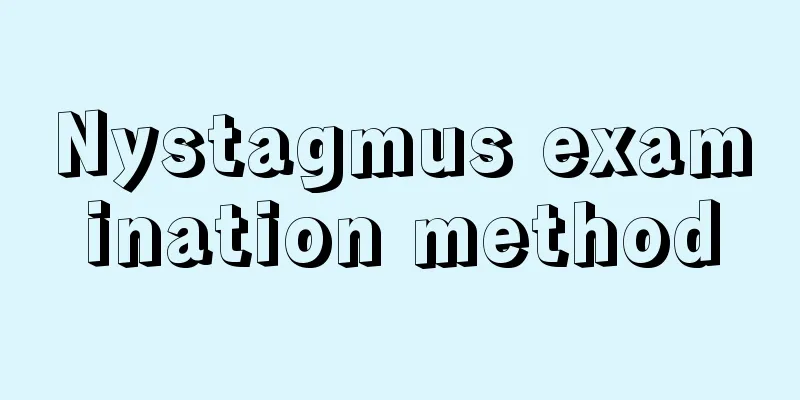Nystagmus examination method

|
Eye disease is a type of health problem that everyone may face. When you feel that your eyeballs are swinging back and forth rhythmically, whether horizontally, vertically or in circles, it means that there may be some pathology in your eyeballs, most likely nystagmus. What examination methods do doctors use when facing this disease? Let us pay attention to it together. 1. What is nystagmus? Nystagmus is an involuntary, rhythmic, back-and-forth eye movement. The directions are divided into horizontal, vertical, rotational, etc., with the horizontal type being the most common. The direction of nystagmus is usually indicated by the fast phase direction, and the fast phase is the compensatory movement to restore the gaze position. It is called nystagmus for short. It is often caused by diseases of the visual system, extraocular muscles, inner ear labyrinth and central nervous system. Nystagmus is not an independent disease, but a clinical manifestation of certain diseases, so treatment should be targeted at the cause. 2. Causes 1. Ocular nystagmus It refers to the central vision disorder of the macula, which is the nystagmus caused by difficulty in forming the gaze reflex. (1) Physiological gaze nystagmus includes oblique nystagmus, visual dynamic nystagmus and latent nystagmus. (2) Pathological fixation nystagmus includes blinding nystagmus, amblyopic nystagmus, occupational nystagmus, etc. 2. Vestibular nystagmus 3. Central nystagmus 4. Congenital idiopathic nystagmus 3. Clinical manifestations 1. Jumping type The eyeball moves back and forth at significantly different speeds. After slowly turning to the other direction to a certain extent, it suddenly returns in a jerky motion. This type of tremor has chronic and fast phases. The chronic phase is the physiological phase, and the fast phase is the corrective movement of the slow phase. The direction of the fast phase is the direction of nystagmus, and the fast phase is related to the cause. 1. Swing type The movement of the eyeball is like a pendulum, with no fast or slow phases. Its speed and amplitude are equal. It is more common in patients with binocular amaurosis and amblyopia. 4. Inspection Methods 1. General examination Ask the patient to look straight ahead and observe the nystagmus as he follows the examiner's finger moving in a certain direction. Some examinations require covering one eye. To this end, the following points should be noted during inspection: (1) Is the nystagmus latent or manifest? (2) Whether the nystagmus is combined—the movements of the two eyes are in sync with each other—or dissociated. (3) Type, direction, degree, frequency, amplitude, etc. of nystagmus. (4) Whether there is an endless eye position. 2. Special inspection Electronystagmography and other instrumental examinations. 5. Treatment 1. First of all, symptomatic treatment should be carried out according to the cause of the disease. 2. Surgical treatment: Congenital idiopathic nystagmus can be treated with surgery to move the resting eye forward to improve vision and reduce or inhibit the occurrence of nystagmus. |
<<: Causes of oral mucosal blood blisters
>>: What are the symptoms of a dislocated jaw?
Recommend
What is the best way to disinfect a room
Keeping the room clean and hygienic will make you...
What is the cause of abdominal pain at the age of 12
Abdominal pain is a common condition in the human...
At what age should you get the flu vaccine
Many people get the flu vaccine in winter because...
A brief analysis of the diagnostic methods for gallbladder cancer
In recent years, gallbladder cancer has become on...
What is the reason for long hair on the back
Although the condition of the back cannot general...
What is a yoga ball good for?
Nowadays, many women are keen on practicing yoga....
Publicizing knowledge about the harms of smoking
Many male friends like to smoke, and it is diffic...
Does the removal of gallbladder cancer affect the digestive tract?
The main function of the gallbladder is to store ...
Can vitamin B12 be taken long term?
Vitamin B12 is an essential element for the human...
The efficacy and contraindications of hair crystal
Rutilated Quartz is a relatively common collectib...
I feel itchy after drinking barley and red bean water
Red bean is a crop that only grows in the south. ...
What is stage 1 thyroid cancer? What are the symptoms of stage 1 thyroid cancer?
Everyone may be familiar with thyroid cancer. Bec...
What is the cause of clubbing?
Clubbing is a very common human disease in medici...
What to do if you get spicy
Since chili peppers contain a large amount of cap...
What are the dangers of nasopharyngeal cancer
In life, the health hazards brought by nasopharyn...









